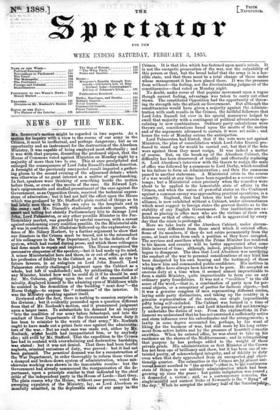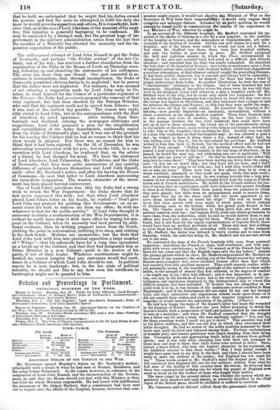NEWS OF THE WEEK.
fusion. Mr. Gladstonef 11 d th ex lanator de- was in con r. o owe up e p fence of Mr. Sidney Herbert, by a further argument to show that our disasters in the Crimea must be traced, not to the misconduct of his colleagues in the War Department, but to the defects of the , at least retire from such a position as they have occupied. system, which had rusted during peace, and which those colleagues had done much to repair and improve. The House recognized the
" into the condition of our army before Sebastopol, and into the conduct of those Departments of the Government whose duty it has been to minister to the wants of that army," Mr. Roehttek ought to have made out a prima facie case against the administra- tors of the war. -r But no such case was made out, either by ifr. Roebuck whEsS health had incapacitated him, or by anybody MR. RoioncR's motion might be regarded in two aspects. As a motion for inquiry with a view to the rescue of our army in the Crimea, it must be ineffectual, and perhaps dangerous ; but as an opportunity and an instrument for the destruction of the Aberdeen Ministry, it was capable of being employed most effectually ; and it was with that purpose, discarding the professed object, that the House of Commons voted against Ministers on Monday night by a majority of more than two to one. This at once precipitated and enlarged the consequences of Lord John Russell's sudden desertion. A foresight of the previously unexpected result imparted a gather- ing gloom to the second evening of the adjourned debate ; which was otherwise of no great interest as a matter of speechmaking. In fact, speakers were thinking of something beside the motion before them, or even of the merits of the case. Sir Edward Lyt- ton's epigrammatic and studied presentment of the case against the Government, as an Opposition thesis, received the technical expres- sions of admiration; but it had not half the effect upon the House which was produced by Mr. Stafford's plain recital of things as he hittl lately seen them with his own eyes in the hospitals and in the Calnp ; and Mr. Disraeli's studiously moderate speech, with *beet and telling but strictly Parliamentary hits to damage Lord John, Lord Palmerston, or any other possible Minister in the Par- liamentary market, was guarded by careful reserves, with a caveat against condemning every coalition possible. On the Ministerial side
persuasive eloquence of the speaker,—but it had made up its min& A minor Ministerialist here and there, in or out of office, put forth his profession of fidelity to the Cabinet as it was, with an eye to future favours, in an enlogium on Lord John Russell. Lord Palmerston stoutly challenged judgment upon the Cabinet as a whole, but left it undefended; and, by predicating the duties of any Minister, hinted how well he could do it if he should be sent for. Mr. Osborne, getting upon the roof of the unassailed Ad- miralty, displayed himself to the admiring eyes of Middlesex while he assisted in the demolition of the building " next door "—the Horse Gultsgs—to expose the " rottenness" of the interior. It Was the IffEistry speeking against itself. Reviewed after the fact, there is nothing to occasion surprise in
genuine .representation of the nation, one single impracticable the division ; but it evidently proceeded upon a question different pally being self-excluded. The Cabinet was formed in pa time of from that of Mr. Roebuck's motion, and it pronounced judgment
peace, for purposes of peace ; and Lord Aberdeen did not knowing- upon a larger issue. To substantiate his demand for an inquiry
else ; dal e'en" by Mr. Stafford. That the expedition to the Crimea anxieties. When he entered office, he was about to take up bus has had to contend with overwhelming and destructive hardships, residence on the shores of the Mediterranean; and in relinquishing was stated: but it was not denied. That there had been fear ul that purpose he has perhaps added to the weight of those neglects, criminal omissions of duty, was proved : but it had not private griefs. His administration as first Minister of the Crown been gainsaid. The practical demand was for a reconstruction of nas not been one of brilliancy and show, but it has been one of an- ew War Department, in order thoroughly to reform those vices of tainted purity, of acknowledged integrity, and of fidelity to duty a decayed and broken-down system of administration, whose mis- even when that duty approached from an unexpected .and objec- chievons working was shown in the lamentable results : but the tionab4e quarter. The calamities in the Crimea are by, almost uni- Government had already commenced the reorganization of the de- versatassent ascribed to " the system "-that is, to the continuous partment, upon a principle similar to that indicated by the chief state of things in our military administration which had been critic of the independent party in the House of Lords—Earl Grey. growing up since the peace : butpUblic indignation was roused ; The plain reason why the House, without ease proven, voted the it degiapded a victim ; and, -as a contemporary remarks, the
weeping expulsion of the Ministry, lay, as Lord Aberdeen so single-min' and earnest Duke of Newcastle is the " Byng" of
manfully admitted, in the deplorable state of our army in he
stances very diffierent from those amid which it entered office. Scone of its members, if they do not retire permanently from the The services and sacrifices which the Prime Minister has rendered to his Queen and country will be better appreciated after some
little interval of time ; although, indeed, prejudices have -already begun to disappear. The idea that Lord Aberdeen was sacrificing the conduct of the war to personal considerations of any kind' has been dissipated by his own bearing and the testimony of those who knew him and commanded public confidence. His motives in taking office have always been known to be pure. He accepted an onerous duty at a time when it seemed almost impracticable to form a stable Ministry, quite impracticable to form one on any ordinary party foundations. It was net a " coalition " in the old sense of the word,—that is, a combination of party men for per- sonal objects, -or a conspiracy of parties for factious objects,—but it was a genuine congress of men representing different circles, laying aside party distinctions, and taking up the country in a
Crimea. It is that idea which has fastened upon men's minds. It is not the energetic prosecution of the war, nor the culpability of this person or that, but the broad belief that the army is in a hor- rible state, and that there must be a total change of those under whose management it has been placed there. It was the pressure from without—the feeling, not the discriminating judgment of the constituencies—that voted on Monday night. No doubt, under cover of that popular movement upon a vague though correct feeling, advantage was taken to carry out other views. The constituted Opposition had the opportunity of throw- ing its strength into the attack on Government. But although the constituencies would have given a majority against the Adminis- tration with such results in the Crimea, the faithful followers that Lord John Russell led over in his special manoeuvre helped to swell that majority with a contingent of political adventurers spe- culating in new combinations. Ordinary party calculations were thrown out, considerations based upon the merits of the motion and of the arguments advanced to sustain it were set aside ; and hence the vote of Monday outran the anticipation. Lord Palmerston had hinted, that if the vote were not against Ministers, the plan of consolidation which Lord John Russell pro- fessed to stand up for would be carried out, but that if the Iiote were against them they must resign. It was indeed a matter of course. But, on the break-up of the Aberdeen Cabinet, the difficulty has been discovered of readily and effectually replacing it. Lord Aberdeen's interview with the Queen to resign the seals of office was followed by a summons to Lord Derby, which resulted in his failure to form an Administration ; and then the summons passed to another statesman. A Ministerial crisis in the course of a war would at any time have been regarded as a severe contre- temps; but a Ministerial crisis precisely when the remedies were about to be applied to the lamentable state of affairs in the Crimea, and when the union of powerful states on the Continent against a common enemy was approaching practical operations, is a calamity. England, that had taken the lead in organizing the alliance, is now exhibited without a Cabinet, under circumstances which must suggest to foreign states the gravest doubts as to the stability of any English Government. Our institutions are ex- posed as placing in office men who are the victims of their own fickleness or that of others; and the evil is aggravated by every day that the crisis is prolonged. ifere we take leave of the Aberdeen Cabinet, under circum-
ly undertake the duties of war. From the explanation.s .in Par- liament we understand that he has not exercised a sufficiently active and stern influence over his subordinates and the arrangements; a laxity in some degree accounted for, perhaps, by his want of liking for the business of war, but atill more by his long retire- ment from-active habits and by the pressure of heartfelt domestio
the day.'jWheis he accepted the military half of the Seoretaryshig, that he held, we anticipated that he might find his duties exceed his powers, and that the mole he attempted,to fulfil his duty the more he would provokeoppesition and odium. It is remarkable, how- ever, that, as in the case of Lord Aberdeen at the moment of his saari- floe, this injustice is &enerally beginning to be confessed. He may be succeeded by a stronger man, bat the greatest hope of im- provement in the military administration arises from the fact that the sacrifice of a Ministry has attested the necessity and the im- perative expectation of the public.



























